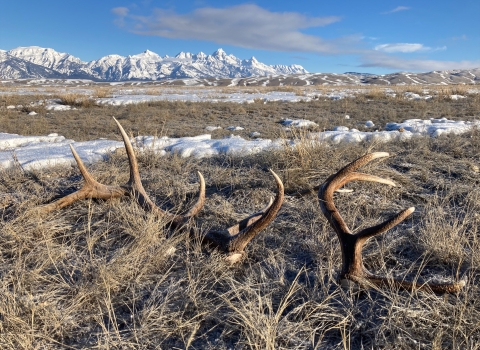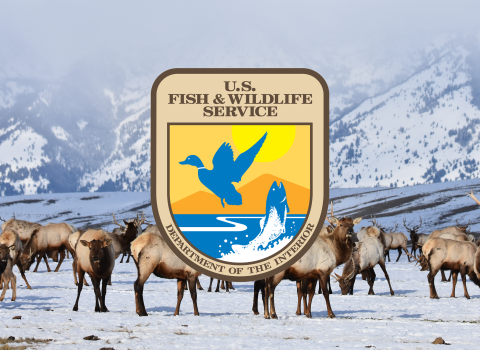BALTIMORE, MD (November 13, 2023) – Today the U.S. Fish and Wildlife Service and the National Fish and Wildlife Foundation announced 25 grants totaling $7.4 million for projects that support wildlife habitat, climate resilience, community conservation partnerships, and equitable access to nature in the Chesapeake Bay watershed.
This year’s grants will advance the goals of the Chesapeake Watershed Investments in Landscape Defense (Chesapeake WILD) Program and leverage more than $12 million in grantee matching funds, for a total conservation impact of $19.4 million. The awards announced today will ultimately improve recreational access along more than 31 miles of river and trails, restore more than 32 riparian riparian
Definition of riparian habitat or riparian areas.
Learn more about riparian miles of forest habitat, improve passage along nearly 120 river miles for migratory fish species, and protect more than 4,700 acres of fish and wildlife habitat, including 2,000 acres of key wildlife corridors in high-elevation areas that will allow species to shift habitats in response to climate change climate change
Climate change includes both global warming driven by human-induced emissions of greenhouse gases and the resulting large-scale shifts in weather patterns. Though there have been previous periods of climatic change, since the mid-20th century humans have had an unprecedented impact on Earth's climate system and caused change on a global scale.
Learn more about climate change . Many of these projects address conservation needs in vulnerable communities.
“This partner-driven program prioritizes projects that are led by communities and that respond to climate change,” said Service Director Martha Williams. “The work done through these funded projects helps ensure we achieve meaningful and lasting outcomes for all watershed residents now and in the future.”
“The Chesapeake WILD program adds critical new resources, agency support and technical assistance investments for habitat restoration and protection, public access and community engagement activities across the Chesapeake Bay watershed,” said Jeff Trandahl, executive director and chief executive officer of the National Fish and Wildlife Foundation. “We look forward to working with the U.S. Fish and Wildlife Service and our many partners in the Chesapeake Bay watershed to continue building on the foundation’s long legacy of conservation and restoration efforts in the region.”
The Chesapeake Bay is the largest estuary in the U.S. and home to thousands of species of plants and animals. Nearly 1 million waterfowl winter on and near the bay each year — approximately one-third of the Atlantic Coast’s migratory population. More than 18 million people live and work in the Chesapeake Bay region, many depending on industries tied to the health of the watershed, like outdoor recreation, farming and fishing.
The Chesapeake WILD program was established to support collaborative conservation in the watershed and provide grant funding for community-driven projects that align with five interrelated focal areas for sustaining the health of the watershed and its inhabitants into the future:
- Conserving and restoring imperiled fish and wildlife habitats
- Enhancing climate resilience and readiness
- Building community partnerships and conservation capacity, including in vulnerable communities
- Increasing equitable public access for recreation and human connections with nature.
- Improving water quality
The Service partners with NFWF to deliver the Chesapeake WILD grant program as part of the foundation’s broader Chesapeake Bay Stewardship Fund — a portfolio of competitive grant programs helping to restore and protect the Chesapeake Bay watershed.
Examples of this year’s grant awards include:
- Earth Conservation Corps ($74,900) will work with partners to restore Noonan's Run of the Little Patuxent River, enhance habitat for several species of endangered birds, dragonflies and freshwater mussels and, working with AmeriCorps, provide young people from vulnerable communities with hands-on experiences and pathways to pursue green careers.
- Ruffed Grouse Society ($546,500) will work with partners to create and enhance early- and late-successional forest habitat to support declining bird species across more than 1,600 acres along Pennsylvania’s Kittatinny Ridge through invasive species invasive species
An invasive species is any plant or animal that has spread or been introduced into a new area where they are, or could, cause harm to the environment, economy, or human, animal, or plant health. Their unwelcome presence can destroy ecosystems and cost millions of dollars.
Learn more about invasive species control, regeneration harvests and improved roads to better enable forest management and habitat restoration. - National Aquarium ($232,700) will partner to implement a community engagement plan focused on habitat restoration, stewardship, community science and meaningful education programming, establish an 8,000-square-foot floating wetland habitat featuring a live oyster reef, and pilot a network for native seed collection in support of Maryland’s 5 million trees initiative.
- Friends of the Great Dismal Swamp National Wildlife Refuge ($582,200), a non-profit organization dedicated to promoting a better understanding and appreciation for the natural environment of the refuge, will collaborate with partners to restore, conserve and improve access to the Great Dismal Swamp National Wildlife Refuge, executing an action plan that will conserve the refuge’s ecosystems and make it more accessible and enjoyable for the public, particularly those from vulnerable communities.
A full list of 2023 Chesapeake WILD grant projects is available here. For more information about NFWF’s Chesapeake Bay Stewardship Fund, please visit www.nfwf.org/chesapeake.



